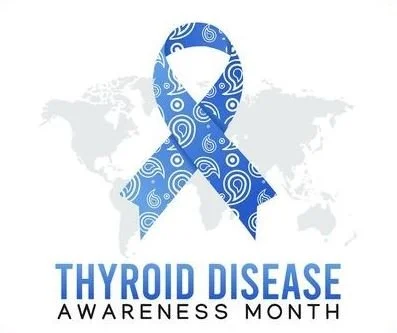January is Thyroid Awareness Month
Part of your body’s endocrine system, the thyroid, is a small butterfly-shaped gland in your throat and is responsible for releasing and regulating hormones that regulate your metabolism, the process through which your body converts food into energy. Thyroid disease can cause the gland to be overactive or underactive. An overactive thyroid is known as hyperthyroidism; underactive thyroid is called hypothyroidism. When your thyroid is working as it should, you’re probably not aware of its functioning but, when it’s not, you might notice a range of symptoms, some of which might affect your feet. An experienced foot doctor like Middlesex County podiatrists Dr. Jason Grossman and Dr. Paul A. Osemene can help you find relief.
Approximately 20 million Americans have thyroid disease. Anyone can get thyroid disease at any age. People of all ages are at risk, but women with thyroid disease outnumber men by a factor of five to eight times. Those with diabetes are more vulnerable than others.
Have you noticed any of the following symptoms throughout your body? They all point to a possible issue with your thyroid:
insomnia or fatigue
weight loss or weight gain
dry, coarse hair or hair loss
sensitivity to heat or intolerance for cold
In the feet, symptoms of thyroid disease can include swelling, very dry skin with cracked, bleeding heels, and a constant sensation of cold that is not relieved with warm socks and shoes. Of course, these symptoms can point to a wide range of issues, and only your podiatrist can provide the expert examination, careful diagnosis, and effective treatment you need.
If your doctor suspects that thyroid disease is the cause for your uncomfortable symptoms, he will likely refer you to your primary care physician. Often diagnosing thyroid disease with a physical exam and a simple blood test reveals atypical levels of thyroid-stimulating hormone (TSH) and T3 and T4 thyroid hormones. Imaging tests are another means of evaluating the disease. Medication usually accomplishes initial treatment for thyroid disease. Surgery is occasionally appropriate but is always a last resort.
Are you concerned about the effects of thyroid disease on your feet, or do you have another concern about the health and wellness of your feet, ankles, or lower legs? Call the friendly Advanced Feet and Ankle Care staff at (732) 679-4330 or click here to schedule a convenient appointment with Jason Grossman, DPM, and Paul A. Osemene, DPM, in our modern, comfortable offices in Old Bridge and Sayreville today.

